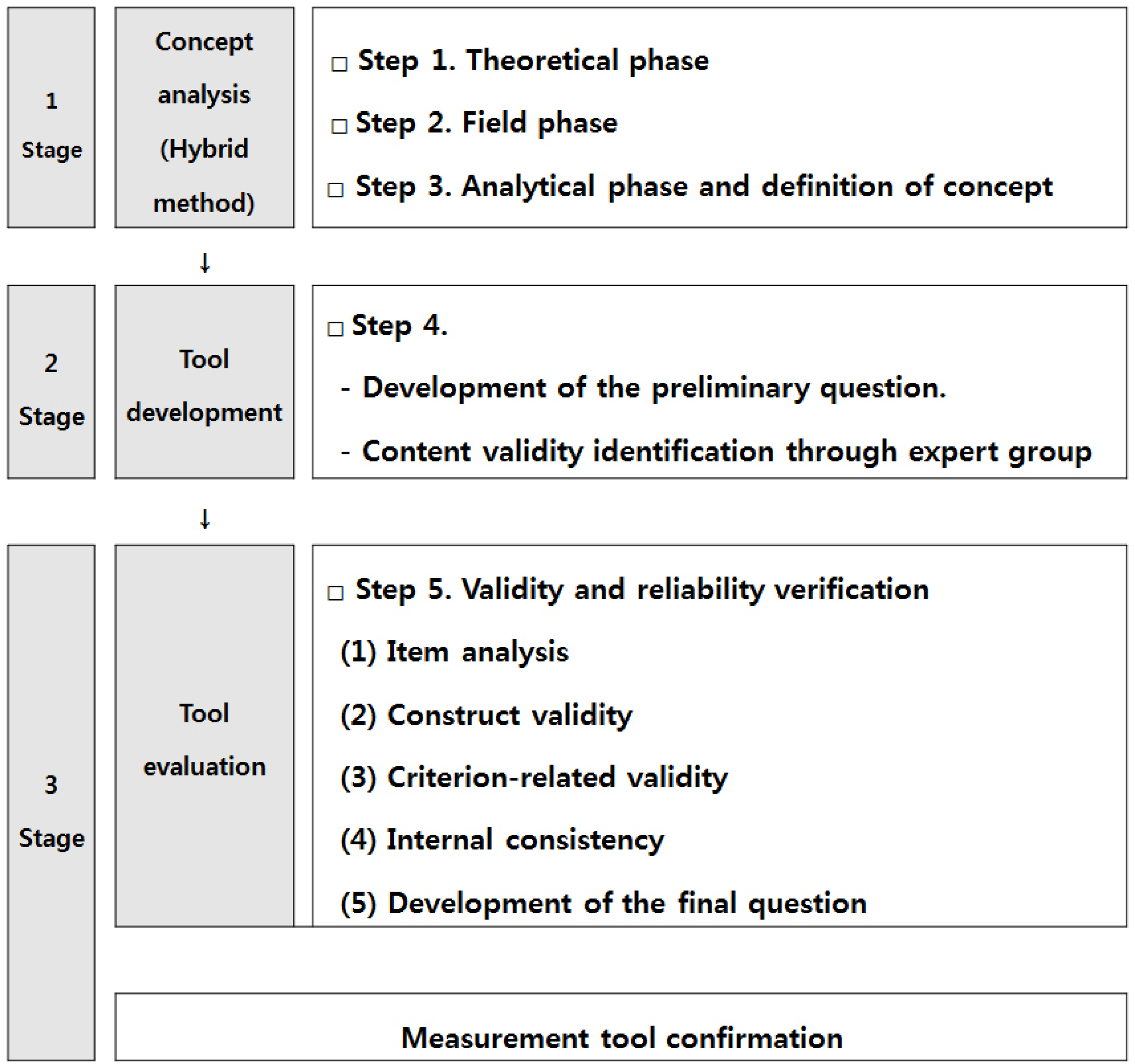J Korean Acad Nurs Adm.
2018 Jun;24(3):221-233. 10.11111/jkana.2018.24.3.221.
Development of Emotional Labor Measurement Tool for Hospital Nurses
- Affiliations
-
- 1Hoban Hospital, Korea. chong0620@naver.com
- 2Department of Nursing, Kangwon University, Korea.
- KMID: 2415817
- DOI: http://doi.org/10.11111/jkana.2018.24.3.221
Abstract
- PURPOSE
The study was done to analyze attributes of emotional labor experienced by clinical nurses working in domestic hospitals and to develop tools for measurement.
METHODS
The concept of nurse emotional labor was verified through concept analysis based on Hybrid model. The preliminary Nurse Emotional Labor Scale were examined for content validity, reliability and validity. The scale was verified with 500 nurses working in general hospitals located in Kangwon-do.
RESULTS
Attributes of the nurse emotional labor concept were derived from three types: surface type, internalize type and control behaviors and identified as having six constitutive factors: conscious surface behaviors, casual behaviors, empathy effort, repress, solve and endure. The results of the construct validity test of the tool showed 8 factors. The Nurse Emotional Labor Measurement Tool had a significant correlation (r=.35, p < .001) with the Scale of Morris & Felman in result of criterion-related validity. And the internal consistency reliability Cronbach's α coefficient was .93.
CONCLUSION
The development process showed that to accurately describe emotional labor of nurses, it is necessary to consider not only quantitative aspects but also qualitative aspects and content aspects.
Keyword
MeSH Terms
Figure
Reference
-
1. Han SJ, Yoon OS, Kwon MS, Song MS. Comparison of emotional labor and job stress of hospital nursing staff. Korean Journal of Occupational Health Nursing. 2011; 20(1):55–64. https://doi.org/10.5807/kjohn.2011.20.1.055.
Article2. Lee NY, Han JY, Huh MJ. Comparison of satisfaction and need on nursing service perceived by the patients and nurses. Journal of the Korean Data & Information Science Society. 2015; 26(1):169–177. https://doi.org/10.7465/jkdi.2015.26.1.169.
Article3. Yoon SH. Effects of organizational managerial characteristics and job characteristics on job stress and job effectiveness. Korean Journal of Industrial and Organizational Psychology. 2004; 17(3):451–466.4. Hochschild AR. The managed heart: commercialization of human feeling. Berkeley: University of California Press;1983.5. Yeom YH, Son HS, Lee HS. Clinical nurses' experience of emotional labor. Journal of Korean Clinical Nursing Research. 2016; 22(3):314–326. https://doi.org/10.22650/JKCNR.2016.22.3.314.6. Kim HJ, Kim JH. Emotional labor, social support, and depressive symptoms of clinical nurses in a province. Korean Journal of Occupational Health Nursing. 2011; 20(3):308–318. https://doi.org/10.5807/kjohn.2011.20.3.308.7. Kim KO, Cho YC. The relationships between emotional labour and depressive symptoms among nurses in university hospitals. Journal of the Korea Academia-Industrial cooperation Society. 2013; 14(8):3794–3803. https://doi.org/10.5762/KAIS.2013.14.8.3794.
Article8. Yang FH, Chang CC. Emotional labour, job satisfaction and organizational commitment amongst clinical nurses: A questionnaire survey. International Journal of Nursing Studies. 2008; 45(6):879–887. https://doi.org/10.1016/j.ijnurstu.2007.02.001.
Article9. Chou HY, Hecker R, Martin A. Predicting nurses' well-being from job demands and resources: A cross-sectional study of emotional labour. Journal of Nursing Management. 2012; 20(4):502–511. https://doi.org/10.1111/j.1365-2834.2011.01305.x.
Article10. Morris JA, Feldman DC. Managing emotion in the workplace. Journal of Managerial Issues. 1997; 9(3):257–274.11. Cha SK, Shin YS, Kim KY, Lee BY, Ahn SY, Jang HS, et al. The degrees of emotional labor and the its related factors among clinical nurses. Journal of Korean Clinical Nursing Research. 2009; 15(2):23–35.12. Kim IS. The role of self-efficacy and social support in the relationship between emotional labor and burn out, turn over intention among hospital nurses. Journal Korean Academy of Nursing Administration. 2009; 15(4):515–526.13. Kang HA. Changes of nursing professional labor: Enhancement of emotional labor. Journal of Economy and Society. 2002; 55(3):142–168.14. Kim JH, Hyun MY. The moderating effects of social support between job stress and job satisfaction in staff nurses. Korean Academic Society of Occupational Health Nursing. 2005; 14(2):108–117.15. Park SU. Emotional labor research, theoretical, empirical research, experimental study on the reviews [master’s thesis]. Seoul: Korea University;2007. p. 1–102.16. Jansen NWH, Kant I, Nijhuis FJN, Swaen GMH, Kristensen TS. Impact of worktime arrangements on work-home interference among Dutch employees. Scandinavian Journal of Work Environment & Health. 2004; 30(2):139–148.
Article17. Morris JA, Feldman DC. The dimensions, antecedents, and consequences of emotional labor. Academy of Management Review. 1996; 21(4):986–1010. https://doi.org/10.5465/amr.1996.9704071861.
Article18. Brotheridge CM, Lee RT. Development and validation of the emotional labour scale. Journal of Occupational and Organizational Psychology. 2003; 76:365–379. https://doi.org/10.1348/096317903769647229.
Article19. Schwartz-Barcott, D. A hybrid model for concept development. Chinn PL, editor. Nursing research methodology: Issues and implementation. Rockville, MD: Aspen;1986. p. 91–101.20. Nunnally JC, Bernstein IH. Psychometric theory. 3rd ed. New York: Mc-Graw-Hill;1994.21. Byun DS, Yom YH. Factors affecting the burnout of clinical nurses: Focused on emotional labor. Journal of Korean Academy Nursing Administration. 2009; 15(3):444–454.22. Yang YK. A study on Burnout, Emotional labor, and Self-efficacy in Nurses. Journal of Korean Academy of Nursing Administration. 2011; 17(4):423–431. https://doi.org/10.11111/jkana.2011.17.4.423.
Article23. Joung MS, Kim KJ. A study on the effect of emotional labor and leader's emotional intelligence on job satisfaction and organizational commitment for nurses. Korean Society of Hospital Management. 2006; 11(4):1–18.24. Ko JO. Influence of clinical nurses' emotional labor on happiness in workplace. Journal of Digital Contents Society. 2013; 13(4):250–261. https://doi.org/10.5392/JKCA.2013.13.04.250.
Article25. Lee EO, Im YY, Park HA, Lee IS, Kim JI, Bea JE. Nursing research & statistics. Paju: Soomoonsa;2009.26. Kim MJ. Effects of the hotel employee's emotional labor upon the job related attitudes. Journal Tourism Science. 1998; 21(2):129–141.27. Kim SH. A study on the emotional labor of police officials in Korea. Korean Association of Police Science Review. 2009; 11:5–36.28. Kim SH, Ham YS. A meta-analysis of the variables related to the emotional labor of nurses. Journal Korean Academy Nursing Administration. 2015; 21(3):263–276. https://doi.org/10.11111/jkana.2015.21.3.263.
Article
- Full Text Links
- Actions
-
Cited
- CITED
-
- Close
- Share
- Similar articles
-
- Impact of Surface and Deep Acting Emotional Labor on Emotional Dissonance among Ambulatory Care Nurses
- Effects of Emotional Labor on Burnout in Nurses: Focusing on the Moderating Effects of Social Intelligence and Emotional Intelligence
- A study on Burnout, Emotional labor, and Self-efficacy in Nurses
- Effects of Emotional Labor and Communication Competence on Turnover Intention in Nurses
- Effects of Emotional Labor, Job Satisfaction on Turnover in Nurses



